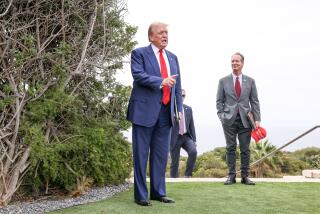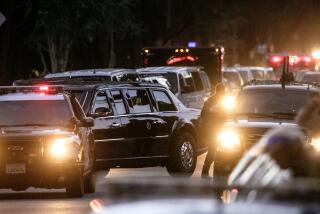Ontario Scrambles for Visit by President
On Wednesday, Ontario Chamber of Commerce President Robert L. Traister was asked what he thought about the president’s upcoming visit. His response: “Which president?”
By Thursday morning, he was helping to coordinate the town hall-style meeting President Bush will hold Saturday morning at Ontario Convention Center.
“I got here this morning, and everybody in the office said: ‘You’ve got to bail us out. The phones are ringing off the hook,’ ” Traister said Thursday. “It has been fast and furious.”
As the White House and local officials launched the inexact but strategic construction of an audience--one that will be packed with Latino business leaders--organizers were quick to note that the event is nonpartisan. But the distribution of many tickets was organized by Bush supporters, and most tickets were spoken for before they had arrived.
As many as 5,000 people are expected, White House officials said.
“It was in one hand and out the other,” said Norm MacKenzie, executive director of the Rancho Cucamonga Chamber of Commerce, one of the business groups charged with distributing tickets. “If you had some scalpers out there, they could make a lot of money.”
Local officials and political insiders, including those who are arranging the visit, say the event is an exercise in symbiosis.
More than he has in other town hall meetings, Bush plans to focus the discussion on job creation and economic development. The Inland Empire, largely because of its sustained and explosive growth, appears relatively insulated from the recession, said John Husing, the area’s leading economist, who briefed White House aides on the inland region recently in anticipation of the event.
Much of the region’s insulation is because of the growth of small businesses, especially Latino-owned enterprises. Those business owners, many of whom would benefit from the president’s tax proposals, received the bulk of the tickets made available Thursday.
The event, meanwhile, will allow Bush to reaffirm his long-standing relationship with Latinos, an affiliation that provided him an enormous boost in Texas and helped propel him to the national stage.
The Inland Empire has one of the nation’s fastest-growing Latino communities, state Senate Republican Leader Jim Brulte said Thursday. And it is home to more than 30,000 Latino-owned businesses, ranking sixth among the nation’s metropolitan areas, Husing said. Those businesses, although most are very small, collect more than $5 billion in sales each year, Husing said.
“These are the elements Bush has picked up on,” said Ruth Lopez Williams, the owner of a home health agency in El Monte and chairwoman of the Latin Business Assn. The Los Angeles-based group received 700 tickets Thursday in exchange for its sponsorship--which entailed writing a $10,000 check to the Convention Center to defray the estimated $60,000 cost of playing host to the president.
Williams sees political value in Bush’s overture to Latinos in California. He’s being very strategic and he’s being very wise,” she said.
White House officials say the visit is no more targeted than if Bush had closed his eyes and placed his finger on a map.
“The president travels all over the country talking about matters important to the people of the United States,” White House spokesman Ken Lisaius said Thursday. “He’ll hit the West Coast when he can, and that’s what he’s doing on this trip.”
The White House would be hard-pressed to police the attendance at a large public event like this one. What’s more, officials say, the White House was less concerned about controlling the audience for this town hall meeting than it has been for other such occasions, simply because the president is enjoying very high approval ratings.
Still, while there is an element of spontaneity, the president’s town hall functions are designed to seat him in front of a friendly crowd. So the White House sets a tone, those involved in the process said Thursday.
That began with the choice of a region considered fairly conservative, but still an important site of swing votes, mostly among transplants from Los Angeles and Orange counties whose political beliefs are more moderate than those of their liberal or conservative parents. And it continued in the distribution of blocks of tickets through business organizations and chambers of commerce whose members, by and large, support the White House.
For example, distribution of one batch of tickets was coordinated through the office of Hector V. Barreto Jr., the Los Angeles businessman Bush named to head the Small Business Administration, Williams said.
“The idea that the president is coming to the Inland Empire, we’re all proud of it,” MacKenzie said. “He’s putting us on the map. We’re an economic area that people should be taking note of. But obviously, this business community, they all support the Republican thought process.”
That thought process can be traced in large part to one man: Sen. Brulte of Rancho Cucamonga, one of three people who were instrumental in setting Saturday’s event in motion.
Brulte was a presidential aide when Bush’s father was in the White House. He has had a relationship with the family ever since, and is considered the president’s “political brains” in California, Bush’s senior White House political advisor, Karl Rove, has said.
In December, Brulte met in Washington with Rove. Told that Bush was planning a trip to California, Brulte suggested that the president use Brulte’s home turf--Ontario, seven miles southwest of his district offices in Rancho Cucamonga.
Back home, Brulte worked to seal the deal with several elected officials and business leaders, primarily a father-son team who are among the region’s leading Republican donors.
They are Ted Dutton, a wealthy GOP activist, and his son, Bob Dutton, a Rancho Cucamonga city councilman and the founder of a real estate investment management firm who is running for a state Assembly seat.
According to campaign finance documents reviewed Thursday, the Duttons have given dozens of donations to GOP groups and affiliates in recent years, including Bush, former Gov. Pete Wilson and Brulte.
“We’ve been very, very active in politics for a long time,” Ted Dutton said Thursday. “When the occasion came up, we felt the Inland Empire was a central place in California that was fairly easy to get to and had a lot of impact for all of Southern California.”
More to Read
Get the L.A. Times Politics newsletter
Deeply reported insights into legislation, politics and policy from Sacramento, Washington and beyond. In your inbox three times per week.
You may occasionally receive promotional content from the Los Angeles Times.











